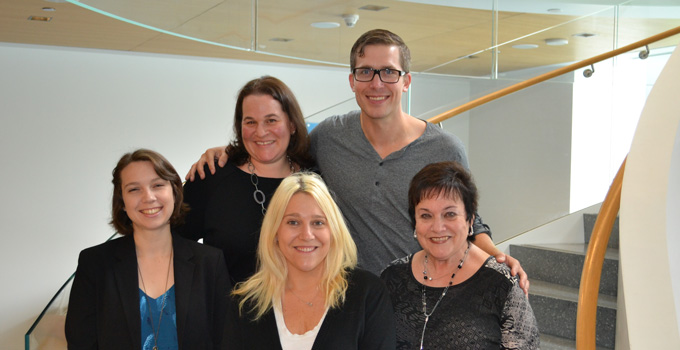
Prostate cancer is a complex disease. In a clinical setting it can be hard for doctors to accurately predict outcomes for prostate cancer patients, especially for those deemed to be at an intermediate risk of recurrence. With intermediate risk cancers, unlike those that are high or low risk, it is unclear how the cancer will develop. This makes it difficult to choose exactly the right therapy and avoid unnecessary treatments and their associated side effects.
Natalie Fox, a PhD candidate in medical biophysics at the University of Toronto who works in OICR’s Informatics and Bio-computing Program, is studying how changes in a patient’s DNA and RNA can be used to provide a more accurate prognosis and facilitate personalized care.
The importance of Fox’s research was recently recognized by Prostate Cancer Canada as they selected her as the first recipient of the Philip Feldberg Studentship, which was established by Mr. Feldberg’s family following his passing from prostate cancer. The award will allow Fox to pursue this important research by providing her with up to $75,000 of support over two years.
“My family and I are committed to contributing to fund research for prostate cancer,” explains Rochelle Feldberg. “When my husband Phil died, it was devastating for me and my children. I lost my best friend, confidante and soul mate and my life changed forever. My grandchildren were deprived of knowing a wonderful, loving, caring person who would have enriched their lives. My children and I will do whatever we can so other families do not have to experience the loss of a loved one. We hope and believe that we will see a cure for prostate cancer.”
Using bioinformatics and statistical techniques, Fox will create and compare patient treatment classifications based on DNA and RNA patterns. Then she will select important features of the data using patient survival information as a guide. Her research will help determine whether better classifications of prostate cancer can be made using DNA data, RNA data or features of both.
Fox is no stranger to applying bioinformatics to prostate cancer as she works in the lab of Dr. Paul Boutros, Principal Investigator in the Informatics and Bio-computing Program, who is leading the CPC-GENE project – a pan-Canadian study of prostate cancer genomics that is the largest study of its type in the world. Her previous experience includes making evolutionary trees to understand how different samples from a single patient relate.
“One of the biggest challenges in prostate cancer comes when you are dealing with disease that is deemed to be of intermediate risk as it is not always clear how to treat these patients,” explains Fox. “By exploring new methods to assess the severity of disease in these cases I hope to allow clinicians and patients better customize prostate cancer therapy.”
